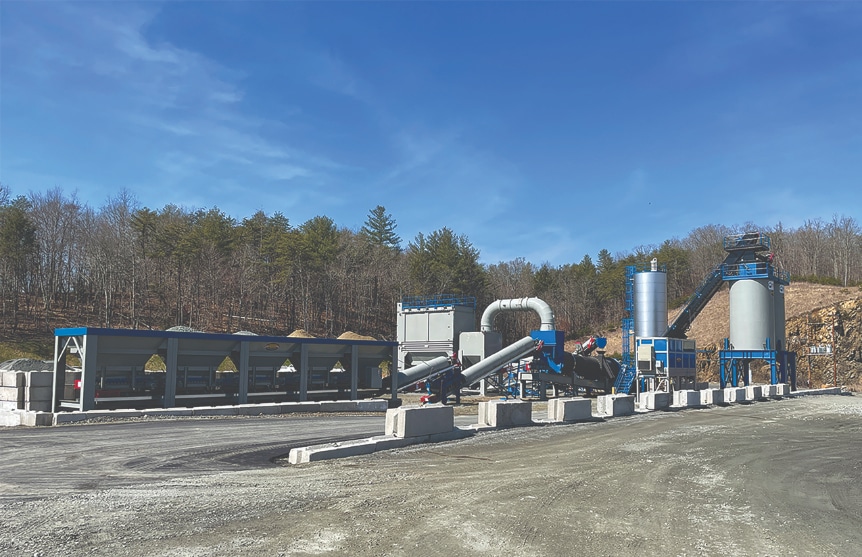Corporate Profile: ADM
BY AsphaltPro Staff

Founded: 1967
Mission Statement: ADM began in 1967 as Panco Corporation, a manufacturer of control panels. By the 1970s, Panco evolved into a manufacturer of asphalt plants. In 1983, Panco became ADM, with the mission of providing the industry’s most extensive sales and service support anywhere.
Categories:
- Plants/plant components pertinent to production (can include crushing equipment)
- Plant controls/automation
- Paving and/or compaction equipment/automation
- Pavement recycling/pavement reclaiming equipment
- Fleet management/telematics/hauling/ticketing software solutions
- Additives/Emulsions/Polymer blends/Fibers/Patching materials
Forward-Thinking Technology
The number-one most-important product trait that ADM brings to the asphalt marketplace is the company’s approach to the design and manufacture of its continuous-mix asphalt plants.
All of ADM’s four series of asphalt plants—the EX Series, MileMaker Series, RoadBuilder Series, and SPL Series—are designed with the utmost in operational efficiency, enabling the cost effectiveness on which producers rely for their maximum return on investment (ROI).
Many plant models allow efficient operation using just one plant operator and one loader operator, while the ability to customize any plant ADM manufactures using standard ADM components, assures just the right asphalt plant for their operations’ specific needs to streamline operational efficiencies at every level.
ADM asphalt plants are available in 60–425 TPH allowing them to operate at the specific production capacity a producer needs for greatest production-site efficiency. Depending on the plant series purchased, ADM plants can handle up-to-25% or up-to-50% RAP. Recycled material in the mix significantly impacts producers’ bottom lines for higher ROI.
ADM asphalt plants fitted with baghouses go even further to improve ROI, since the baghouse allows fines to be reintroduced into the hot mix. In that way, baghouses also save producers in material costs by reducing material, itself.
When it comes to meeting strict environmental standards, ADM counterflow plants are designed and manufactured for clean and efficient operation, practically eliminating blue smoke and hydrocarbon emissions. Further demonstrating operational efficiencies, ADM warm-mix systems allow for the production of mix at reduced temperatures, thus allowing for savings in power and fuel.
The materials used in the manufacturing of ADM hot-mix asphalt plants and other products is of such high quality, strength, and durability that with proper and ongoing plant maintenance, producers can expect a long and productive plant life.

Sustainability with Asphalt
ADM prides itself on its commitment to asphalt sustainability, from reduce to reuse to recycle. The company’s commitment to sustainability greatly benefits the producers ADM serves.
Every plant ADM manufactures is designed to allow producers the use of RAP in their hot mix. Depending on the plant series purchased, producers may use up to 50% RAP. Recycled material in the mix significantly impacts producers’ bottom lines for higher returns on investment (ROI).
ADM asphalt plants fitted with baghouses go even further to improve ROI, since the baghouse allows fines to be reintroduced into the hot mix. In that way, baghouses also save producers in material costs along with reducing material itself.
ADM plants eliminate blue smoke and hydrocarbon emissions, allowing producers to meet strict environmental regulations, while ADM Warm-Mix Systems allow for the production of mix at reduced temperatures, thus allowing for a reduction in power and fuel.
Further demonstrating ADM’s reduce and reuse policies, the company’s engineers carefully spec the steel used in the manufacture of its asphalt plants and design the plants to use most of the steel purchased, with very little scrap, and highly reduced waste. What little scrap is left, is collected and stored on ADM’s lot until sufficient quantities are available to send out for recycling.
ADM also uses recycled steel during its manufacturing processes of plants and components. The Environmental Protection Agency estimates that recycled (secondary) steel production uses about 74% less energy than the (primary) production of steel from iron ore.
https://www.admasphaltplants.com/
(260) 637-5729
